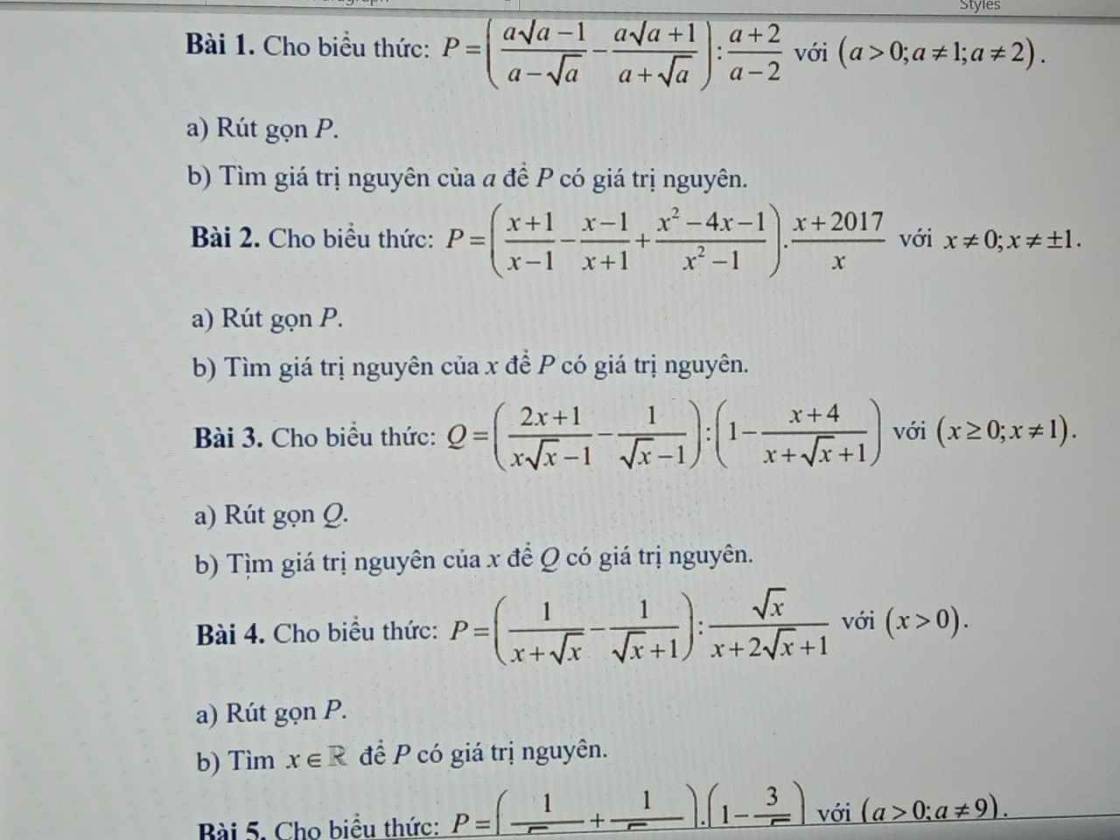Tìm x biết x = \(\sqrt{5+\sqrt{13+\sqrt{5+\sqrt{13+\sqrt{5+\sqrt{13+...}}}}}}\)
Hãy nhập câu hỏi của bạn vào đây, nếu là tài khoản VIP, bạn sẽ được ưu tiên trả lời.


Cách 1: Cái này là định lý Fermat nhỏ thôi bạn. Tổng quát hơn:
Cho số nguyên dương a và số nguyên tố p. Khi đó \(a^p\equiv a\left[p\right]\)
Ta chứng minh định lý này bằng cách quy nạp theo a:
Với \(a=1\) thì \(1^p\equiv1\left[p\right]\), luôn đúng.
Giả sử khẳng định đúng đến \(a=k\left(k\inℕ^∗\right)\). Khi đó \(k^p\equiv k\left[p\right]\). Ta cần chứng minh khẳng định đúng với \(a=k+1\). Thật vậy, với \(a=k+1\), ta có:
\(\left(k+1\right)^p=k^p+C^1_p.k^{p-1}+C^2_pk^{p-2}...+C^{p-1}_pk^1+1\) (*)
((*) áp dụng khai triển nhị thức Newton, bạn có thể tìm hiểu trên mạng)
(Ở đây kí hiệu \(C^n_m=\dfrac{m!}{n!\left(m-n\right)!}\) với \(m\ge n\) là các số tự nhiên và kí hiệu \(x!=1.2.3...x\))
Ta phát biểu không chứng minh một bổ đề quan trọng sau: Với p là số nguyên tố thì \(C^i_p⋮p\) với mọi \(1\le i\le p-1\)
Do đó vế phải của (*) \(\equiv k^p+1\left[p\right]\). Thế nhưng theo giả thiết quy nạp, có \(k^p\equiv k\left[p\right]\) nên \(k^p+1\equiv k+1\left[p\right]\), suy ra \(\left(k+1\right)^p\equiv k+1\left[p\right]\)
Vậy khẳng định đúng với \(a=k+1\). Theo nguyên lí quy nạp, suy ra điều phải chứng minh. Áp dụng định lý này cho số nguyên tố \(p=7\) là xong.
Cách 2: Đối với những số nhỏ như số 7 thì ta có thể làm bằng pp phân tích đa thức thành nhân tử để cm là được:
\(P=a^7-a\)
\(P=a\left(a^6-a\right)\)
\(P=a\left(a^3-1\right)\left(a^3+1\right)\)
\(P=a\left(a-1\right)\left(a+1\right)\left(a^2-a+1\right)\left(a^2+a+1\right)\)
Nếu \(a⋮7,a\equiv\pm1\left[7\right]\) thì hiển nhiên \(P⋮7\)
Nếu \(a\equiv\pm2\left[7\right];a\equiv\pm3\left[7\right]\) thì \(\left(a^2-a+1\right)\left(a^2+a+1\right)⋮7\), suy ra \(P⋮7\). Vậy \(a^7-a⋮7\)

a) Từ giả thiết : \(\dfrac{1}{a}+\dfrac{1}{b}\text{=}\dfrac{1}{c}\)
\(\Rightarrow2ab\text{=}2bc+2ca\)
\(\Rightarrow2ab-2bc-2ca\text{=}0\)
Ta xét : \(\left(a+b-c\right)^2\text{=}a^2+b^2+c^2+2ab-2bc-2ca\)
\(\text{=}a^2+b^2+c^2\)
Do đó : \(A\text{=}\sqrt{a^2+b^2+c^2}\text{=}\sqrt{\left(a+b-c\right)^2}\)
\(\Rightarrow A\text{=}a+b-c\)
Vì a;b;c là các số hữu tỉ suy ra : đpcm
b) Đặt : \(a\text{=}\dfrac{1}{x-y};b\text{=}\dfrac{1}{y-x};c\text{=}\dfrac{1}{z-x}\)
Do đó : \(\dfrac{1}{a}+\dfrac{1}{b}\text{=}\dfrac{1}{c}\)
Ta có : \(B\text{=}\sqrt{\dfrac{1}{a^2}+\dfrac{1}{b^2}+\dfrac{1}{c^2}}\)
Từ đây ta thấy giống phần a nên :
\(B\text{=}a+b-c\)
\(B\text{=}\dfrac{1}{x-y}+\dfrac{1}{y-z}-\dfrac{1}{z-x}\)
Suy ra : đpcm.
Mình bổ sung đề phần b cần phải có điều kiện của x;y;z nha bạn.

Ta có :
\(Q=\dfrac{x+1}{x-\sqrt[]{x}+1}\left(x\inℕ\right)\)
\(\Leftrightarrow Q=\dfrac{\left(x+1\right)\left(\sqrt[3]{x}+1\right)}{\left(\sqrt[3]{x}+1\right)\left(x-\sqrt[]{x}+1\right)}\)
\(\Leftrightarrow Q=\dfrac{\left(x+1\right)\left(\sqrt[3]{x}+1\right)}{\left(x+1\right)}\)
\(\Leftrightarrow Q=\sqrt[3]{x}+1\)
Để \(Q\inℕ\)
\(\Leftrightarrow\sqrt[3]{x}+1\inℕ\)
\(\Leftrightarrow\sqrt[3]{x}\inℕ\)
\(\Leftrightarrow x=\left\{x\inℕ|x=k^3;k\inℕ\right\}\)

Câu 1 :
a) Ta có : \(P\text{=}\left(\dfrac{a\sqrt{a}-1}{a-\sqrt{a}}-\dfrac{a\sqrt{a}+1}{a+\sqrt{a}}\right):\dfrac{a+2}{a-2}\)
\(P\text{=}\left(\dfrac{\left(\sqrt{a}-1\right)\left(a+\sqrt{a}+1\right)}{\sqrt{a}\left(\sqrt{a}-1\right)}-\dfrac{\left(\sqrt{a}+1\right)\left(a-\sqrt{a}+1\right)}{\sqrt{a\left(\sqrt{a}+1\right)}}\right):\dfrac{a+2}{a-2}\)
\(P\text{=}\left(\dfrac{a+\sqrt{a}+1}{\sqrt{a}}-\dfrac{a-\sqrt{a}+1}{\sqrt{a}}\right):\dfrac{a+2}{a-2}\)
\(P\text{=}\dfrac{2\sqrt{a}}{\sqrt{a}}:\dfrac{a+2}{a-2}\)
\(P\text{=}2:\dfrac{a+2}{a-2}\text{=}\dfrac{2.\left(a-2\right)}{a+2}\)
b) Để P có giá trị nguyên \(\Leftrightarrow\dfrac{2.\left(a-2\right)}{a+2}\in Z\)
\(\Leftrightarrow\dfrac{2.\left(a+2\right)-8}{a+2}\in Z\)
\(\Leftrightarrow2-\dfrac{8}{a+2}\in Z\)
\(\Leftrightarrow\dfrac{8}{a+2}\in Z\Leftrightarrow\left(a+2\right)\inƯ\left(8\right)\)
Do đó ta có bảng
| a+2 | 1 | 2 | 4 | 8 | -1 | -2 | -4 | -8 |
| a | -1(TM) | 0(KTM) | 2(KTM) | 6(Tm) | -3(tm) | -4(tm) | -6(tm) | -10(tm) |
Vậy..........

\(\sqrt[3]{17\sqrt{5}-38}\text{=}\sqrt[3]{5\sqrt{5}-30+12\sqrt{5}-8}\)
\(\text{=}\sqrt[3]{\left(\sqrt{5}-2\right)^3}\)
\(\text{=}\sqrt{5}-2\)

Trước tiên ta cần chứng minh : \(1^2+n^2+\dfrac{n^2}{\left(n+1\right)^2}\text{=}\left(n+1-\dfrac{n}{n+1}\right)^2\)
\(\Leftrightarrow2.\left(\dfrac{n\left(n+1\right)}{n+1}-\dfrac{n}{n+1}-\dfrac{n^2}{n+1}\right)\text{=}0\)
\(\Leftrightarrow2.0\text{=}0\left(LĐ\right)\)
Ta có : \(E\text{=}\sqrt{1+2007^2+\dfrac{2007^2}{2008^2}}+\dfrac{2007}{2008}\)
Với bổ đề trên thì :
\(E\text{=}\sqrt{\left(2007+1-\dfrac{2007}{2008}\right)^2}+\dfrac{2007}{2008}\)
\(E\text{=}2008+\dfrac{2007}{2008}-\dfrac{2007}{2008}\)
\(E\text{=}2008\)

Trước tiên ta cần phải rút gọn biểu thức A trước.
Ta có : \(A\text{=}\dfrac{\sqrt{x+2\sqrt{x-1}}+\sqrt{x-2\sqrt{x-1}}}{\sqrt{x+\sqrt{2x-1}}+\sqrt{x-\sqrt{2x-1}}}\)
\(A\text{=}\dfrac{\sqrt{x-1+2\sqrt{x-1}+1}+\sqrt{x-1-2\sqrt{x-1}+1}}{\sqrt{x+\sqrt{2x-1}+\sqrt{x-\sqrt{2x-1}}}}\)
\(A\text{=}\dfrac{\sqrt{\left(\sqrt{x-1}+1\right)^2}+\sqrt{\left(\sqrt{x-1}-1\right)^2}}{\sqrt{x+\sqrt{2x+1}+\sqrt{x-\sqrt{2x+1}}}}\)
\(A\text{=}\dfrac{\sqrt{x-1}+1+|\sqrt{x-1}-1|}{\sqrt{x+\sqrt{2x-1}+\sqrt{x-\sqrt{2x-1}}}}\)
\(A\text{=}\dfrac{\sqrt{x-1}+1+\sqrt{x-1}-1}{\sqrt{x+\sqrt{2x-1}+\sqrt{x-\sqrt{2x-1}}}}\left(x\ge2\right)\)
\(A\text{=}\dfrac{2\sqrt{x-1}}{\sqrt{x+\sqrt{2x-1}+\sqrt{x-\sqrt{2x-1}}}}\)
\(A\text{=}\dfrac{2\sqrt{2\left(x-1\right)}}{\sqrt{2x-1+2\sqrt{2x-1}+1}+\sqrt{2x-1-2\sqrt{2x-1}+1}}\)
\(A\text{=}\dfrac{2\sqrt{2\left(x-1\right)}}{\sqrt{\left(\sqrt{2x-1}+1\right)^2}+\sqrt{\left(\sqrt{2x-1}-1\right)^2}}\)
\(A\text{=}\dfrac{2\sqrt{2\left(x-1\right)}}{\sqrt{2x-1}+1+\sqrt{2x-1}-1}\left(x\ge2\right)\)
\(A\text{=}\dfrac{\sqrt{2x-2}}{\sqrt{2x-1}}\)
Xét tử thức và mẫu thức của A ta thấy :
\(\sqrt{2x-2}< \sqrt{2x-1}\left(x\ge2\right)\)
\(\Rightarrow A< 1\left(đpcm\right)\)

\(x=\sqrt{5+\sqrt{13+\sqrt{5+\sqrt{13+\sqrt{5+\sqrt{13+...}}}}}}\)
\(\Leftrightarrow x=\sqrt{5+\sqrt{13+x}}\) (\(x\ge0\))
\(\Leftrightarrow x^2=5+\sqrt{13+x}\)
\(\Leftrightarrow x^2-9=\sqrt{13+x}-4\)
\(\Leftrightarrow\left(x-3\right).\left(x+3\right)=\dfrac{x-3}{\sqrt{13+x}+4}\)
\(\Leftrightarrow\left[{}\begin{matrix}x=3\\x+3=\dfrac{1}{\sqrt{x+13}+4}\left(∗\right)\end{matrix}\right.\)
Xét (*) ta có VT \(\ge3\) (1)
mà \(VP=\dfrac{1}{\sqrt{x+13}+4}\le\dfrac{1}{4}\) (2)
Từ (1) và (2) dễ thấy (*) vô nghiệm
Hay x = 3